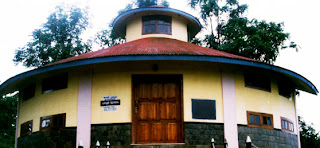

Pazhassiraja Museum Calicut, Kerala
History
Pazhassiraja Museum is beautifully nestled among the picturesque
locations of the district of Calicut (Kozhikode) in Kerala. Calicut city
has become an ultimate destination for the historians and aficionados
of art and literature. Kerala has lured the visitors and traders from
lands far off from time immemorial. Similar was the case of the
Portuguese traveler, who set sails towards India and reached India in
1498 - the name of that sailor was Vasco Da Gama. An art gallery is
located in the vicinity of the museum. The gallery exhibits a number of
paintings of Kerala's respected artists, including the Raja Ravi Varma
and Raja Raja Varma, who were the connoisseurs of painting and other
performing arts. Their paintings, which are preserved artifacts, tell
the tales from the past that were not included in any scripture, the
lore of then modern culture. They also depict the tradition and bounties
from the wars and successions over the neighboring rulers by the ruler
of Kozhikode. Everything is enlisted in visual history of Kerala, which
is summarized into a few oil paintings of these masters.
Pazhassiraja Museum is maintained and preserved by the State Archaeology Department of Kerala. The museum showcases a number of stunning works of art. The ancient coins preserved here can be a delight to look at. Apart from this, the museum also secures traditional bronze sculptures and utensils, umbrella stones, miniature models of temples which are crafted out of plaster of Paris and similar megalithic structures.
There is an interesting story behind the christening of Pazhassiraja Museum. The museum and the art gallery both are named after the great Pazhassiraja of the Padinjare Kovilakom, of the Kottayam regal kin. The much popular 'Pazhassi Revolt', which took place during the British epoch against the British East India Company, was captained by Pazhassiraja. Popularly termed as the Lion of Kerala, Pazhassiraja is the one who is recognized for introducing guerilla warfare in the hills of Wayanad, to resist the British colonialism. The museum seems to be living entity breathing on the cultural heritage, as it assimilates in itself a number of artifacts and items which are a part of Kerala's intellectual heritage. Not just the artifacts but the architecture of the place itself depict the traditional Keralite architecture and hence are preserved as a part of Kerala's cultural heritage
Pazhassiraja Museum is maintained and preserved by the State Archaeology Department of Kerala. The museum showcases a number of stunning works of art. The ancient coins preserved here can be a delight to look at. Apart from this, the museum also secures traditional bronze sculptures and utensils, umbrella stones, miniature models of temples which are crafted out of plaster of Paris and similar megalithic structures.
There is an interesting story behind the christening of Pazhassiraja Museum. The museum and the art gallery both are named after the great Pazhassiraja of the Padinjare Kovilakom, of the Kottayam regal kin. The much popular 'Pazhassi Revolt', which took place during the British epoch against the British East India Company, was captained by Pazhassiraja. Popularly termed as the Lion of Kerala, Pazhassiraja is the one who is recognized for introducing guerilla warfare in the hills of Wayanad, to resist the British colonialism. The museum seems to be living entity breathing on the cultural heritage, as it assimilates in itself a number of artifacts and items which are a part of Kerala's intellectual heritage. Not just the artifacts but the architecture of the place itself depict the traditional Keralite architecture and hence are preserved as a part of Kerala's cultural heritage



No comments:
Post a Comment